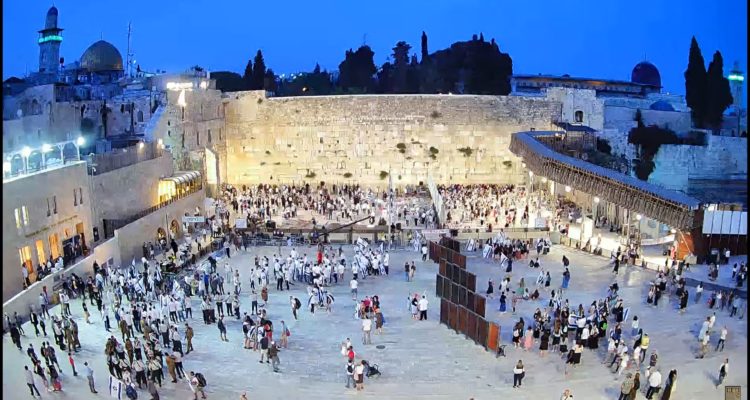
Heavy security is in place for celebrations in honor of the anniversary
of the city’s unification in the 1967 Six Day War.
With most of the coronavirus health crisis behind them and able to gather outside again, Israelis flocked Sunday to the Western Wall of the Old City to mark the start of Jerusalem Day, celebrating the reunification of the city 54 years ago.
There was a heavy police presence in the city following several days of unrest, and leaders of the Palestinian terror group Hamas called for more violence, but security forces were keeping a close watch as celebrations began at sundown with dancing at the Western Wall of the ancient Jewish Temple.
Split in half during the 1948 War of Independence when Jordan illegally occupied its eastern part, Jerusalem was reunited in 1967 when Israeli forces pushed the Jordanian army out of the city.
The reunification opened up Jerusalem’s famous Old City and its holy sites, with Jews once again able to pray at the Western Wall, revered as the holiest site in Judaism next to the Temple Mount. Under Jordanian rule, the Western Wall was off-limits for Israelis, and Jews in general.
Under Israeli rule, access to the holy sites for all religions has been steadfastly preserved, with Prime Minister Benjamin Netanyahu promising earlier in the day not to let Arab rioters deny access to the city.
“We will not allow any extremist element to undermine the quiet in Jerusalem. We will uphold law and order – vigorously and responsibly. We will continue to guard freedom of worship for all faiths but we will not allow violent disturbances,” Netanyahu said.
“For 54 years, Jerusalem has been united under the rule of the democratic State of Israel. When one looks back over thousands of years of Jewish rule and the foreign rule, and today again under the state of the Jews, only under the sovereignty of Israel has full and consistent freedom of worship been ensured for all faiths, and this we will continue,” Netanyahu said.
Jerusalem Day celebrations begin with a traditional prayer at the Western Wall plaza followed by singing and dancing. Other events include concerts, special displays at Jerusalem’s museums and receptions.
The annual traditional flag parade is scheduled to begin Monday afternoon with tens of thousands marching through the center of Jerusalem to the Old City and the Western Wall.
Tourism Ministry officials are hoping that Israel’s emergence from the pandemic will help boost the city’s economy, which normally accounts for almost 22% of the total employment in the city of almost one million residents.
Jerusalem is the most popular destination for tourists in Israel and in a record year attracted about 3.6 million tourists in 2019 before the coronavirus pandemic brought worldwide tourism to a standstill.
“Jerusalem, the capital of Israel, is a city with history, depth, variety and spectacular beauty, and it is also the favorite destination for tourists from abroad,” said Tourism Minister Orit Farkash-Hacohen. “I sincerely hope that in the near future we will be able to see tourists roaming the Old City.”
“In years past, Jerusalem was a magnet for millions of Christians from around the world,” the minister noted. “I have no doubt that, in the coming years, it will also attract Arab and Muslim tourists from the Emirates, Morocco, Bahrain and other countries.”
Israel has one of the world’s best success stories with coronavirus vaccinations. Almost 5.5 million of Israel’s 9.3 million citizens have received the coronavirus vaccine and the infection rate has dropped to near zero, with the Health Ministry on Sunday reporting only 17 new infections in the past day.
Hospitals across the country have all closed their coronavirus wards and only 150 Israelis remain hospitalized with the virus.
The economy has gradually opened up and the country is hoping that as other nations catch up to Israel’s vaccination levels, the tourists will return to boost Jerusalem Day next year.
(World Israel News).